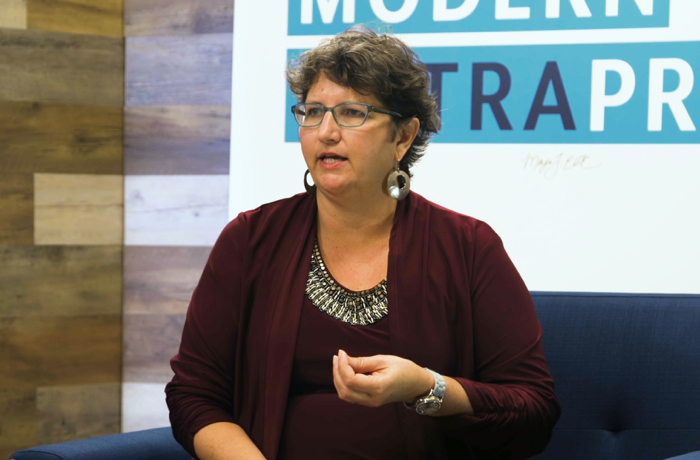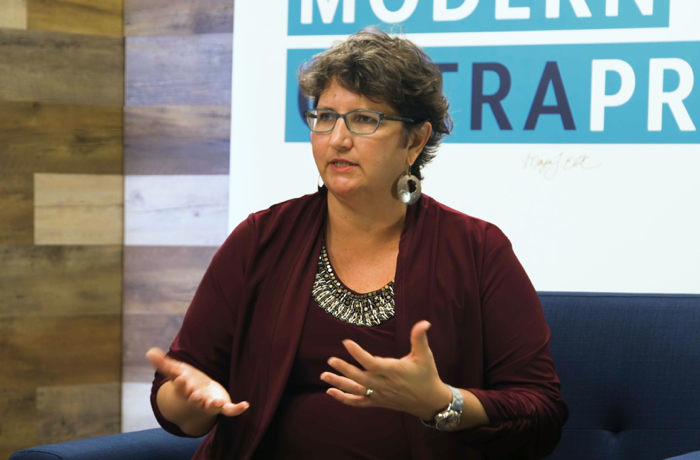Minette Riordan is the owner of a successful coaching business, an award-winning entrepreneur, and a best selling author. For over 10 years she ran a multi-media publishing company, growing a small quarterly publication to a monthly magazine with a circulation of 50,000. She made the leap from print to digital in 2009. After successfully selling advertising face-to-face for a decade, learning to sell online was a challenge – one that she’s been continually studying and practicing ever since.
In This Episode
Minette Riordan shares why you need an exit strategy before you start a business, how fearlessness is both an asset and a burden in mastering her craft, and how she learned to disconnect from the belief that money is a bad thing.
Topic Timeline:
0:55 Have an Exit Strategy Before Taking the Leap
After five years of failure, Minette didn’t know where she was going with her business.
1:49 Fearlessness
Both an asset and a burden, trying new things allowed her to really master her craft.
4:13 All-in-One Business Solution to the Rescue
Being able to systemize marketing while catering to the customer journey has worked wonders.
5:53 Money Mindset
Disconnecting from the belief that making money is a bad thing.
7:08 Return to the Intimate
Connecting and supporting people in their day-to-day lives is the responsibility of modern entrepreneurs.

– Dr. Minette Riordan
Show Transcript:
LR: Welcome to Modern Ontrapreneur, I’m Landon Ray. Today I have Dr. Minette Riordan, who is the owner of a successful coaching business and award winning entrepreneur and best selling author. For over ten years she ran a multi-media publishing company, growing a small quarterly publication to a monthly magazine with a circulation of 50,000 copies a month. She made the leap from print to digital in 2009. After successfully selling advertising face to face for a decade, learning to sell online was a challenge – one that she’s been continually studying and practicing ever since. Thank you so much for being here.
MR: Thanks for having me. I’m happy to be here.
LR: You’ve been doing this for a while now.
MR: Yeah.
LR: If you could go back and talk to your earlier self as you were starting out and give yourself a piece of your experienced wisdom now, what would that be?
MR: You know it’s funny, I was just having a conversation with someone else. I wish somebody would have said, “Have an exit strategy in place.”
LR: Interesting.
MR: Know what your end game is. When I first started that publishing company, my kids were little. I thought, “This is going to be fun. How hard can it be?” Just jumped in with both feet. Didn’t really have any idea. I had been a schoolteacher, had sold a lot of jewelry. Had done nothing related to business, but I just said, “Okay, I can do this.” I did do it and I made every mistake along the way. About five years in I hit that point where I had no idea where I was going. It was really frustrating. It felt like we were working without any purpose. Knowing where you’re going I think is crucially important and knowing how you’re going to get out of it when you don’t want to be doing it anymore.
LR: So, many people start and their goal is to pay for themselves, to make a living and then maybe down the road to make a better living, but you’re right. Most people don’t begin with the idea of putting together something that they may be able to sell or hand off to the next person or something like that. It is definitely valuable. You’ve been successful at a number of different things. What do you feel like your unique skill set is?
MR: Fearlessness? Being a risk taker, just really being willing to try new things and I would say it’s also my biggest nemesis because I’m fearless and love to try new things. It’s the creative part of me. My learning edge this year has really been about mastery. Really honing in on what’s the core of what we teach, the core of what do and how can we really connect that with more people. I find sometimes that our biggest gifts are also our greatest challenges.
LR: How do you determine if you are overdoing it?
MR: The bottom line is a big part of that. I think one of the hardest parts for me as a new, young entrepreneur was not paying attention to my numbers, not looking at the hard parts of that, not looking at what the right numbers were. Just looking at money flowing in and flowing out wasn’t enough. Really focusing in on, “Is this making me money and is this scalable.” In the magazine, in the print magazine business, to make it scalable meant having many magazines, was the model at the time. That wasn’t … I didn’t want to work that hard. I was a brand new mom, hadn’t been married very long, had two little bitty kids and so also understanding what it’s going to take to get to the level of financial success that you want to take and are you willing to go there. I’m not afraid of hard work, but it’s understanding the whole business model and all the different pieces.
LR: Is this even possible.
MR: Is it even possible. Yeah. It was at a time when coaching didn’t exist yet. I didn’t have mentors. I really felt like I was sort of flailing around in the dark and yet so many things went right. We did grow it to 50,000 copies a month. We did gross hundreds of thousands of dollars. I did get named Small Business Owner of the Year by my local chamber. From the outside, it looked great, and I think this is an entrepreneurial journey that doesn’t get told often, is that things can be really pretty on the outside and a huge, fat, ugly mess on the inside of the business.
LR: Interesting. What is working for you now?
MR: Ontraport is actually working really well for us now. My husband is my business partner and he thankfully is super techy, but it’s made us really systemize our marketing in phenomenal new ways and really think about the customer journey differently and really be able to put the right steps in place, which makes us focus on the content that we’re teaching and how do we get better systems in place to make our clients successful. Everything that we’re learning to implement to grow in our own business is then something that we’re able to turn around and go and teach to others.
LR: It’s amazing. It actually does, it does work at the end of the day, huh?
MR: Yeah. I’m super creative, systems are not my favorite thing. Being able to understand where a system actually creates more freedom and doesn’t inhibit freedom is a big part of my learning edge a lot of time.
LR: Yeah, totally. To think about systems as something that you’re actually designing and creating and building. It’s like a sculpture. It is a kind of a creative process in a certain way.
MR: It is, says the software guy. It’s fascinating … learning what your own … I think the other thing about being an entrepreneur is it is so much about the inner game. It’s so much about learning what is it that we’re really good at, outsourcing what we’re not good at, bringing in partners. Oftentimes I might have a system that I don’t even see as a system and it takes that person outside of me to go, “Well, you’re already doing it, we just need to put it in a process that somebody else can do.” It’s just being able to think in a systems perspective has been a bit on the challenging side for me. In a good way.
LR: If you were able to zoom forward a decade or two and look back on your career, what would you like your legacy to be?
MR: Such a great question. I want women business owners to know that they can make a difference in the world with the work that they’re doing and that the more money they make, the more people they get to help. Disconnecting the belief that making money is a bad thing or that it’s going to take over your life and you have to work so hard and all those things to really understanding that impact really comes when we actually have money to give. When we have money to give we have more time to give, so money mindset is a huge part of the work that we do and has also been a big part of my own personal journey along the path. It’s that big picture. I really think that being an entrepreneur is the space where change is going to happen going forward. That we have this amazing opportunity to create the world in a whole fresh new perspective outside of the traditional corporate model. The heartbreak part of that is that women business owners are starting businesses one and a half times faster than men right now and they’re failing significantly more than men in their business. Finding out why that is and fixing that would be an awesome legacy for me.
LR: Absolutely. We’ve named this thing Modern Ontrapreneur to try and get at what’s unique about our moment in history here. What do you think the unique opportunities are that we have and maybe even the responsibilities that we have as entrepreneurs in this moment?
MR: I think it’s the responsibility piece that really drew me as that part of the question. We have an opportunity, I think, to make a huge impact and a huge difference and we’ve seen entrepreneurs over the last couple of decades, Apple, Steve Jobs, Bill Gates, there’s great models, Richard Branson, of doing that. Yet, I think that business has changed dramatically since they all started their businesses. It’s a return to the intimate, is one of the things that I’m seeing, is that people want connection. They don’t want giant mass marketing, they really want relationships, they want stories, they want people. I think we have an opportunity and a responsibility to really connect with people and support them in their day to day life. Not by buying a can of something that’s going to make them feel better or give them more energy, but really showing them you’re not alone on this journey and that there is an opportunity and that we do have a voice and a responsibility and that each of us can contribute in our own tiny little way. Every business has the opportunity to hire somebody, to create jobs for people, to give back in their community, it’s a beautiful, awesome responsibility to be able to create a legacy and make an impact.
LR: Awesome way to finish. Thank you so much for being here. I really appreciate it.
MR: You’re welcome. Thanks, thanks for having me.
LR: Would you mind signing our wall?
MR: I would love to sign the wall.
LR: Great.
Want more Modern Ontrapreneur Podcast?
Check out the previous episode featuring Erin Chase of $5 Dinners.
